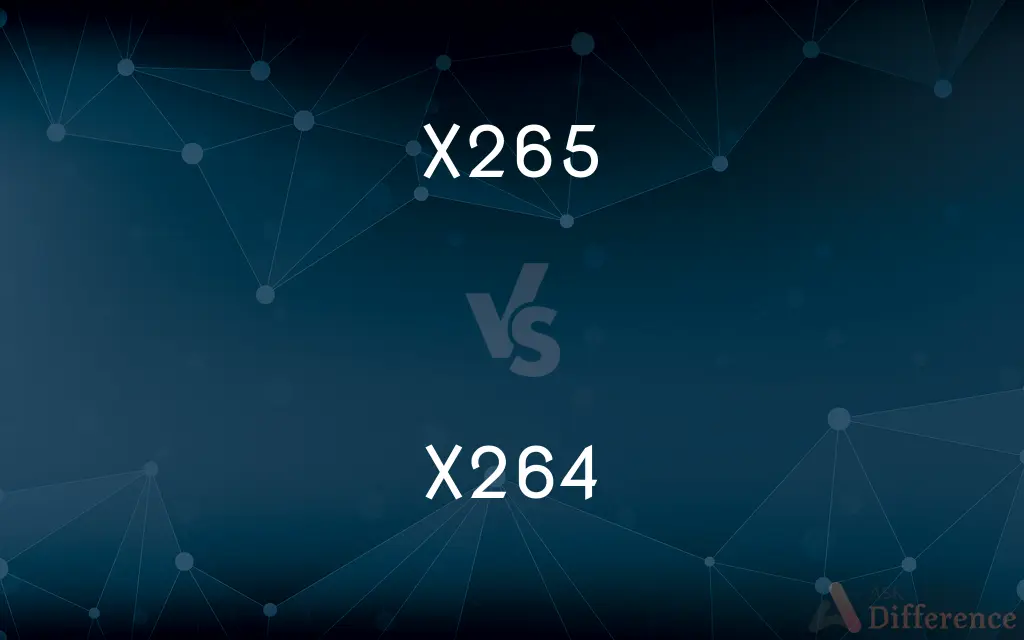X265 vs. X264 — What's the Difference?
Edited by Tayyaba Rehman — By Fiza Rafique — Published on December 3, 2023
X265 encodes video using the H.265/HEVC compression standard, optimizing for higher efficiency, while X264 uses the H.264/AVC standard, widely adopted for HD video.

Difference Between X265 and X264
Table of Contents
ADVERTISEMENT
Key Differences
X265 is a software that encodes video files into the H.265/HEVC compression standard, offering improved compression efficiency. On the contrary, X264 is an encoder for H.264/AVC, which is an earlier standard commonly used for HD videos.
In terms of file size, X265 tends to produce smaller files with equivalent or even superior quality to X264. The efficiency of X265 makes it particularly suitable for 4K or higher resolution videos where storage space is a concern.
From a technical perspective, the major advancement with X265 is its improved compression algorithm, which provides better quality at lower bitrates. X264, although slightly older in its technology, remains a reliable and widely accepted choice for HD content.
Compatibility is one area where X264 has an advantage. Since H.264/AVC is more established, a wider range of devices and players support X264 encoded files. X265, being newer, might not be supported on older devices without the right software.
To summarize, while X265 is the newer, more efficient encoder tailored for the evolving needs of high-definition content, X264 still stands strong due to its wide acceptance and compatibility.
ADVERTISEMENT
Comparison Chart
Compression Standard
H.265/HEVC
H.264/AVC
File Size
Generally smaller for similar quality.
Slightly larger than X265.
Quality at Lower Bitrates
Superior, especially in high resolutions.
Good, but might not match X265.
Compatibility
Supported on newer devices and software.
More universally compatible.
Age & Adoption
Newer, gaining popularity especially for 4K content.
Older, widely adopted for HD video.
Compare with Definitions
X265
Associated with the future of video encoding due to its advancements.
With the rise of 8K content, X265 will likely become even more prevalent.
X264
An encoder tailored for H.264/AVC video compression.
The video was compressed using X264, ensuring wide compatibility.
X265
An encoder for H.265/HEVC video compression.
The movie was encoded using X265, ensuring optimal quality and size.
X264
Software that offers reliable video compression for HD content.
For his video project, he chose X264 due to its proven reliability.
X265
A tool that targets improved video quality at lower bitrates.
Streaming platforms might utilize X265 to deliver high-quality content at reduced bandwidth.
X264
The predecessor to X265, dominant in the HD video era.
Most older HD movies were encoded using X264.
X265
The successor to X264, offering better compression efficiency.
For 4K content, many prefer X265 for its enhanced performance.
X264
A standard in video encoding for many years.
Despite newer options, X264 remains a popular choice among many.
X265
Software optimized for high-definition video compression.
Using X265, the 4K video was efficiently compressed.
X264
Recognized for its balance between quality and compatibility.
He encoded the video in X264, knowing it would play seamlessly on most devices.
Common Curiosities
Do all media players support X265?
No, not all media players support X265, especially older ones. Newer software or updates might be required.
Is X264 more widely compatible than X265?
Yes, X264 is more universally compatible, especially with older devices and software.
Why might someone choose X265 over X264?
They might choose X265 for its superior compression efficiency, especially for 4K or higher resolution videos.
Which provides better compression: X265 or X264?
X265 provides better compression, especially for higher resolution content.
Which encoder is older: X265 or X264?
X264 is older than X265.
Why is X265 preferred for 4K content?
X265's enhanced compression efficiency makes it particularly suitable for large files, like 4K content.
Is X264 still relevant with the rise of X265?
Yes, due to its wide compatibility, X264 remains relevant, especially for content targeted at a broad audience.
Is X265 the future of video encoding?
While X265 is gaining popularity due to its efficiency, the choice between X265 and X264 will depend on specific needs and compatibility.
Are X265 files always smaller than X264?
Generally, for the same quality, X265 files tend to be smaller than X264.
Can I convert X265 videos to X264?
Yes, conversion tools exist that allow for re-encoding from X265 to X264, though there might be some quality loss.
Can X265 and X264 achieve the same video quality?
While both can achieve high video quality, X265 can often do so at lower bitrates compared to X264.
Is the difference between X265 and X264 noticeable to the average viewer?
Not always. The perceptual difference might be subtle, but in terms of file size and bandwidth, X265 has a clear advantage.
Is X265 only suitable for 4K or can it be used for HD?
While X265 shines with 4K, it can also be used effectively for HD content.
Are there any drawbacks to using X265?
Compatibility can be an issue with older devices or software. Also, encoding in X265 can be more resource-intensive.
Which encoder is faster: X265 or X264?
X264 is generally faster, while X265, with its more advanced compression, can be more resource-intensive and time-consuming.
Share Your Discovery

Previous Comparison
Gravitational Potential Energy vs. Elastic Potential Energy
Next Comparison
Sensory Neurons vs. Motor NeuronsAuthor Spotlight
Written by
Fiza RafiqueFiza Rafique is a skilled content writer at AskDifference.com, where she meticulously refines and enhances written pieces. Drawing from her vast editorial expertise, Fiza ensures clarity, accuracy, and precision in every article. Passionate about language, she continually seeks to elevate the quality of content for readers worldwide.
Edited by
Tayyaba RehmanTayyaba Rehman is a distinguished writer, currently serving as a primary contributor to askdifference.com. As a researcher in semantics and etymology, Tayyaba's passion for the complexity of languages and their distinctions has found a perfect home on the platform. Tayyaba delves into the intricacies of language, distinguishing between commonly confused words and phrases, thereby providing clarity for readers worldwide.













































